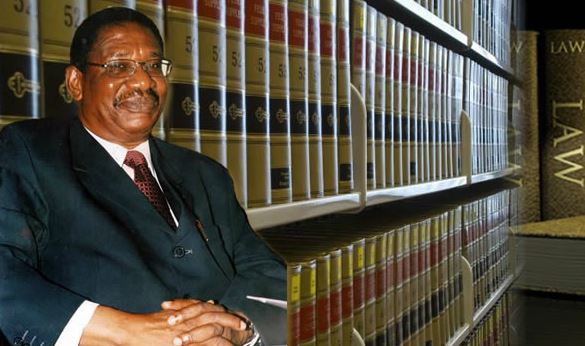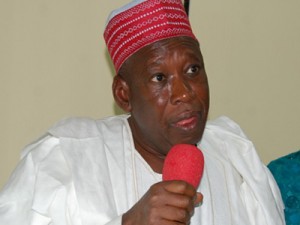
Unic Press UK: Presidential Advisory Committee Against Corruption (PACAC) Chairman, Itse Sagay (SAN), has further expressed support for the crackdown on judicial officers by the Department of State Services (DSS).
While speaking in Abuja on Monday, the 17th October 2016, at a news conference on the activities of PACAC that was established in August 2015, Sagay said:
“I think that those who have criticised the DSS and the manner the search was conducted or even criticised the whole idea of a search being conducted seem not to have looked at the implications of judicial corruption.
“At the end of the day when there is corruption anywhere, who do you take the matter to? It is to the judge. The judge is the ultimate and, in fact, the buck stops at his court. So, if that judge is complicit in the corruption then that is the end of the fight against corruption. That is the awful implication!
“So, any judge who is corrupt is committing a crime – in fact, one can even say it’s a crime against humanity because it just destroys our confidence in a system which should sustain the state in law and order. It encourages people to resort to self-help because there is no hope in taking a matter to court.
“Today, just to give an example, we have some sitting governors who we all knew that they did not win an election. Because they killed their way into office, people are still dying in those states, for them to sustain themselves in that office.
“Yet some courts at the highest level gave approval to the process that brought those people to what I would call their bloody seats on which they are sitting. These are some of the things we are talking about. If the judiciary is corrupt, the only body, the only arm of government that has the power of life and death over Nigerians, if they are corrupt, then it is frightening.
“Isn’t it enough that billions of naira was found in private residences? Don’t you associate these billions of Naira with the fact that your roads are in a state of disrepair, that your hospitals are under-equipped or ill-equipped, and that schools are dilapidated and that it affects your daily life? What of those in the public service today who cannot get salaries paid because all these monies came from the public purse?
“The point I am making is that we seem to want to eat an omelet without breaking eggs; that is what Nigerians want. There are Nigerians who say, ‘Ooh, we are suffering a lot of hardship since the Buhari government came and that we are better off under corruption.
“Isn’t that the most terrible thing for anybody to mouth, without considering what would have happened if Buhari had not come? If that had been the case, I don’t think that there would have been a country today; I think that Zimbabwe would have been better because this is a government that is operating on little or no budget because by the time they came in, what was existing had been squandered completely and shared among those now being defended with cries of ‘human rights.
“What I am saying is that it is very discouraging because if you are struggling for the masses of this country, for the welfare of Nigerians, for improvement of the standard of living and then you are not encouraged, the tendency is for you to give up. For people to prefer corruption to the integrity that we are seeing in government today is very shocking. And I can tell you that if I were in government, I would have been extremely discouraged.
“We cannot have it both ways. We need the judiciary but we need an upright judiciary; without that, one arm of government would collapse; democracy would collapse. Let us think of the implication of what is going on. If we don’t put the judiciary right and we don’t have a judiciary in which we have confidence, a judiciary with integrity and honour, a judiciary with moral authority, then we have no government and we have no democracy.
“You people remember the era of Justice Eso, Oputa, Aniagolu, Nnamani, Idigbe, Mohammed Bello and Obaseki. Which DSS would have dared to question any of those people? Nobody! No agency of government would have dared it. They gave a lot of their judgments against the military government. I can cite over 20 judgments which they gave against military government. They gave a judgment against Buhari’s military government, saying he had no power to retire some people; the Manager of the Fire Service in Lagos, Garba. It was held that his retirement (by the military regime) was illegal. I can cite so many. There was also Ojukwu’s case and everybody knows that. It (Supreme Court) held that the powers that be, the military government, could not engage in self-help by preventing Ojukwu from living in his father’s house. Ojukwu got judgment and instead of appealing, they went and threw him out. Then, the Supreme Court held that for throwing him out and preventing him from accessing his father’s house, rather than appealing that judgment, they (military) are deprived of the right to come to this court. The moral authority of former Justices of the golden era Supreme Court was that of the highest power in the land. That moral authority has crashed and, therefore, having crashed, like a tree that has fallen, ants, lizards and all sorts of things can climb over it. You bring yourself down and then, whatever happens after that is your own fault.
“The ordinary man like you and I could be guilty of corruption but a judge should never be guilty of corruption. Once a judge does that, he brings himself to our level and so cannot complain if he is treated the same way that you and I are treated. That is what has happened. Let us be objective and be fair to this country with our commentary and not be narrow-minded.”



